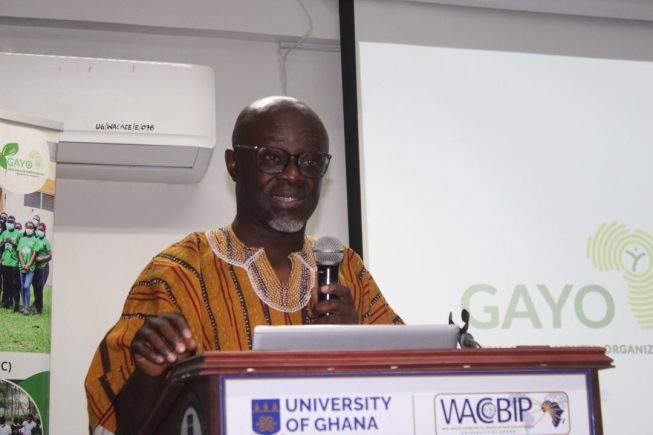A youth-led environmental and climate change advocacy group, the Green Africa Youth Organisation (GAYO), has held a two-day summit and training programme for young people focused on waste management and environmental sustainability.
The summit, which took place at the West African Centre for Cell Biology of Infectious Pathogens (WACCBIP) at the University of Ghana, Accra, on Tuesday, 29th April 2025, brought together over 100 young participants involved in or aspiring to enter the waste management sector.
Organised in collaboration with the Clean Air Fund and the Global Methane Hub, the summit aimed to empower young ecopreneurs with the knowledge, skills, and tools required to formalise, grow, and sustain their green businesses while promoting environmental and social impact nationwide.
![]()
Participants were taken through core areas of business management, financial planning, and strategic decision-making, with the goal of building a strong network of young green entrepreneurs for future collaboration and impact.
The summit followed the success of the previous Developing Youth Ecopreneurs Conference, which trained 30 cohorts, hosted over 500 delegates, and piloted four small-scale enterprises. This latest programme provided targeted training to enhance ongoing initiatives and support those transitioning into eco-driven entrepreneurship.
Tackling unemployment through waste innovation
Speaking at the event, the Project Manager of GAYO’s Zero Waste Cities Project, Jacob Johnson Attakpah said the initiative aimed to tackle two of Africa’s pressing challenges: unemployment and poor waste management.
“GAYO recognises the growing problem of waste in Africa, particularly in urban areas like Accra, while at the same time, the continent faces high levels of unemployment, especially among young people,” he said.
He noted that by combining these two issues, young people could develop business solutions that both address waste and generate sustainable employment. Mr Attakpah explained that participants would be encouraged to develop businesses that utilise waste materials—such as organics, plastics, electronics, and textiles—to create jobs and promote climate justice.
Opportunities in waste segregation
In an interview with the Daily Graphic, the Country Director of the Clean Air Fund, Desmond Appiah, highlighted the economic potential in Ghana’s waste sector, particularly for the youth.
“We have a lot of capacity to address some of the challenges, especially relating to waste and other pollution sources. If you look at the waste structure of our cities, there is plastic, and over 55 per cent is organic waste,” he explained.
“The organics alone offer a lot of opportunity for the development of composting and energy solutions, and there are examples of what people have already done. Other organisations have turned these so-called wastes into resources.”
He further called for a thorough study of waste management technologies used in other jurisdictions and their adaptation to Ghana’s context. Mr Appiah also advocated for legislation on waste segregation to ensure more effective waste disposal.
“The resources needed to clean mixed waste, to make it reusable, are too much. But if we encourage separation at source, we can address some of these challenges,” he said. “I'm hoping that very soon it becomes law—or at least mandatory—that local assemblies require residents to segregate their waste.”
Voices from the participants
One of the participants, Irene Edem Tsyawo, a vegetable farmer and sustainable agriculture advocate from Somanya, praised GAYO for the initiative. She said the summit offered her an opportunity to learn how to transform her composting activities into a viable business.
Ms Tsyawo, who already uses organic waste as compost for her farm, expressed hope that the training would connect her with like-minded peers and help her scale up her business. “The issue of greenhouse gas emissions like methane from unmanaged waste is one reason I ventured into ecopreneurship,” she said.
Albert Gharbin, CEO of Mark Gharbin Farms, said he was keen to learn how to write grant proposals and understand the legal landscape of the green economy. Mr Gharbin operates a circular farming system in which vegetable waste feeds fish and poultry, while animal waste is used as fertiliser for crops.
He expressed interest in new technologies and building networks with fellow ecopreneurs to contribute to environmental sustainability and help address Ghana’s broader waste management challenges.

